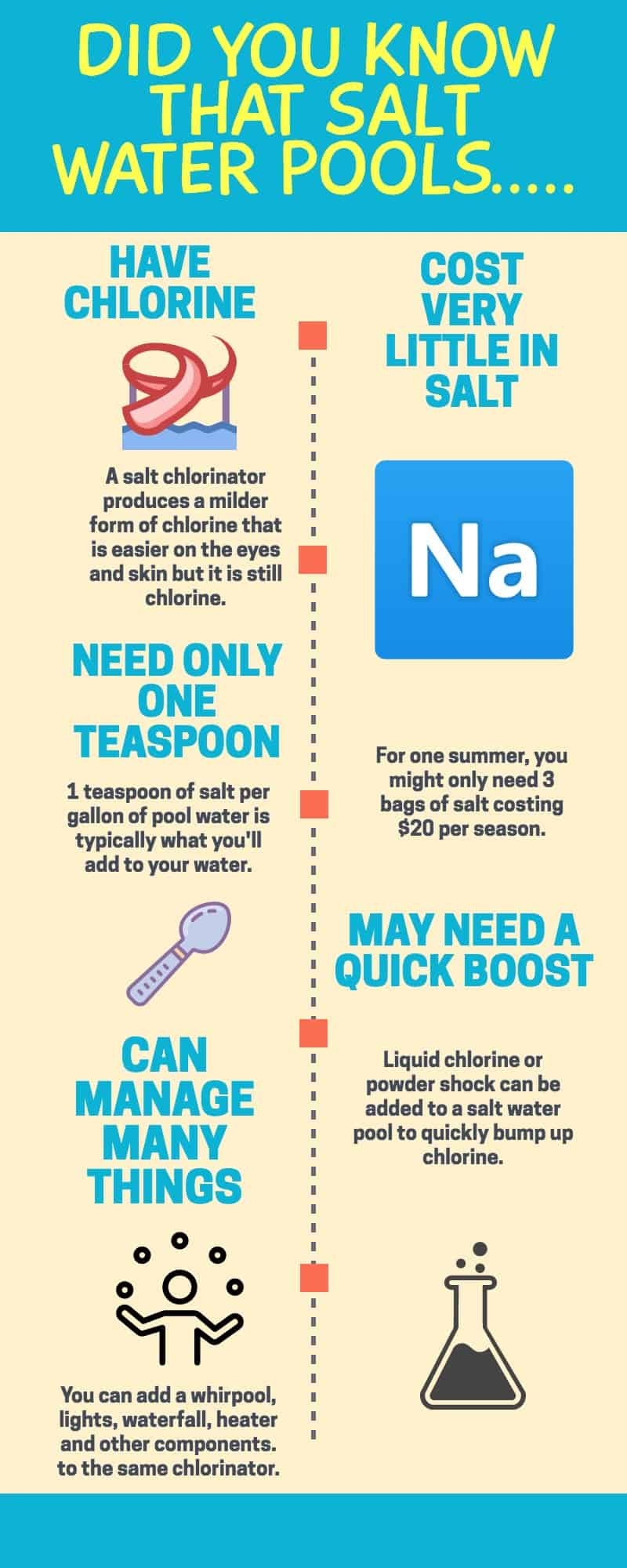You may have read or heard some myths or rumors about salt water pools but unless you know they aren’t true, you may believe them.
The above infographic describes 5 important facts regarding salt water pools that you might not be aware of.
Salt water pools…
Have chlorine
Salt water pools use salt to create chlorine so it is worth mentioning that they do contain chlorine. It’s a milder form of chlorine than the smelly, eye and skin irritating form that is used in regular pools but it is chlorine nonetheless.
It’s also worth a quick note that salt water pools use the same chemicals that are used in other pools when necessary to keep pool water balanced. They use a number of chemicals that you can read about here to help the pool water remain sanitized for swimming.
You might also need algaecide and other chemicals from time to time to keep problems under control.
Need only one teaspoon
Salt water pools typically use 1 teaspoon of salt for every gallon of water. In an average pool season and depending on the size of your pool and other factors, you might only need 2-4 bags of salt added to the pool give or take. Salt is usually added at the beginning of the season and again midway through the summer if required.
Also worth mentioning is the fact that salt doesn’t expire or evaporate. While there are several main reasons that salt needs to be replenished in a pool each year, it isn’t because of these two reasons.
Can manage many things
A salt water pool chlorinator system – depending on how many features it has – can manage multiple other devices other than your salt water pool. Some chlorinators enable you to also manage a:
- Whirlpool or spa pool with multiple valves
- Lighting system
- Waterfall or other water feature
- Pool heater
By using the same chlorinator system, you can add each to a schedule to turn on and off as required automatically.
Cost very little in salt
While you only require several bags of salt per pool season, the cost of the salt is pretty reasonable too. You can easily limit your salt spending to around $20 give or take.
The best part?
Unless your chlorinator manufacturer says otherwise, you can use the same white pellet salt that your water softener uses.
And if you need to buy actual pool salt specifically, while it’s around twice the price of water softener salt, the total yearly cost could be $40 – $50 give or take. Even if it’s $100, it’s cheaper than the amount typically spent on chlorine or bromine.
May need a quick boost
As mentioned, your salt water pool does use chlorine. While the chlorinator can be set up to produce enough liquid chlorine through salt electrolysis to sanitize your pool, some events increase chlorine requirements for your pool that can quickly cause your pool to become cloudy and unsanitized.
While you can use the Super Chlorinate feature of your chlorinator to bump up chlorine in a 24 hour period, you can also do it quicker by using pool shock or another chlorine product in liquid or crystal form. This way, your pool remains sanitized, your chlorinator isn’t overtaxed and you will more quickly address the chlorine deficiency since adding chlorine manually is faster than using the Super Chlorinate feature.

